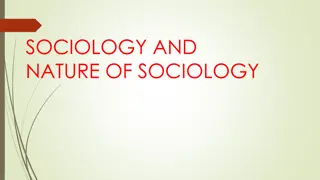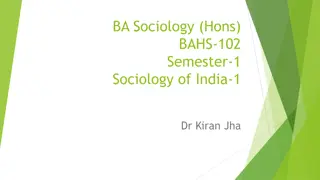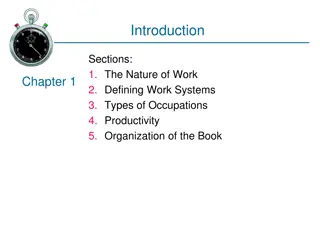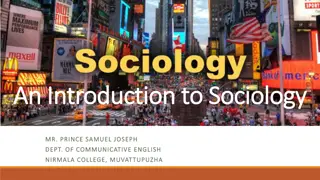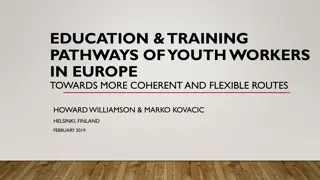Exploring Youth Work and Professionalism in the Sociology of Occupations
The workshop in Brussels delved into the sociology of occupations, emphasizing the evolution of youth work into a profession. It discussed the concepts of occupation, profession, and professionalism, highlighting the importance of specialist knowledge, skills, and ethics. The relevance of youth work in education and non-formal learning was explored, showing the shift towards higher education in the field. Furthermore, the discourse on professionalism highlighted the impact of increased regulation and accountability on practitioners. Public policy interventions and resources in youth work were also discussed, focusing on supporting young people's transition to independent life.
Download Presentation

Please find below an Image/Link to download the presentation.
The content on the website is provided AS IS for your information and personal use only. It may not be sold, licensed, or shared on other websites without obtaining consent from the author. Download presentation by click this link. If you encounter any issues during the download, it is possible that the publisher has removed the file from their server.
E N D
Presentation Transcript
What do you see? A look at youth work through the prism of sociology of occupations Youth worker education and professional pathways workshop Brussels, 10.April 2019 Marti Taru
Occupation and profession Occupation: every activity, work, function or job that is the main source of someone s income. Occupational family / group is a group of several similar occupations, jobs. Profession a specific type of occupation / a professional occupations professional autonomy: a high control of practitioners over the work they are doing social closure: entrance to an occupation (in the status of profession) is restricted Professionalisation: the process of an occupation evolving towards a profession. Professionalism: ways to describe the degree and quality of practice, and the creation of a culture of quality.
Professionalism as a normative value Professionalism as a normative value The value of an occupation emerges from the specialist knowledge and skills that practitioners command and exercise for the good of other people, following professional ethics. Different occupations are valued differently in society A specialist body of (scientific) knowledge its creation, updating and development and transfer through the education system is one of the central tenets of this version of professionalism. formal education system transfers specialist knowledge and skills, is a method for socialising practitioners into professional ethics and integrating them into the body of practitioners.
Youth work relevance: education and NFL Outside youth work Higher education 84% Vocational education 8% Accredited or validated course 5% None of the above 4% In the area of youth work Higher education 42% Vocational education 6% Accredited or validated course 26% None of the above 27%
Professionalism as a disourse Professionalism as a discourse is an understanding that professionalism can be constructed and imposed on an occupation and on practitioners from above . many welfare services are financed from a common budget, not provided on the basis of voluntary activities or market interactions. by public-sector organisations By not-for-profit organisations (NPO) or By business organisations requirements of accountability, trust and transparency increased regulation, audit and assessment Reduced autonomy Increased managerial control
Youth work relevance: opportunities Public policy interventions in the lives of young people, socialisation and transition from childhood to independent life come together with resources for implementing those interventions. A variety of resources are increasingly being allocated to the youth field and youth work, ranging from organisational and local-level budgets to national to cross-national to European programmes like Erasmus+, ESF and other funds. Cross-sectoral / integrated youth policy may bring along a shift towards integration of services that address young people. Youth workers specialised competences
Profession as a professional project profession as a professional project emphasises the agency of professionals in achieving social standing professional groups development is motivated by professionals seeking to establish a monopoly for their service in a society to put them in a better position to influence control over work, including professional autonomy and remuneration
Youth work relevance importance of unification of practitioners. Youth work is a field of practice full of diversities: a multitude of methods, different target groups of young people, expectation to contribute to different social policy goals, voluntary/paid youth worker divide, country differences. While methodological variety can be seen as a strength of youth work, it also has been seen as a challenge and the desire for increasing unity and reducing variety within the youth work field is clearly present a common framework for youth work quality
Youth work relevance Youth worker organisations are functioning in 24 countries and absent in 17 networks, NGOs and youth organisations networks are present in 10 countries The main function of the networks and organisations as presented in the report is to support youth work practice in the countries. there are also three pan-European networks Not too much of organisation
To sum up: youth work as value discourse professional project Relatively few degree programmes in few countries No research centers Many youth workers educated in neighbouring fields of education Challenges and problems with all types of recognitions Value to community and society is considered important: make World a better place , help young people Paid youth work financed from public budget Trainings financed from public budget Instrumentalisation debates Youth work serves certain political and social policy goals Youth work practitioners and organisations have to follow imposed criteria and regulations Social closure not present and neither desirable nor struggled for Professional organisational basis weak, intermingling with neighbouring occupations and professions organisations Some features of this variant present, others not so much Core features of this variant significantly present Core features of this variant not present









